Stinging & Biting: Pest Guide
Mosquitoes
The Mosquitos are found in almost every region and generally flock to places with a high population, such as residential areas and buildings.
Habitat
The Female mosquitos breed only in stagnant water and are also found near old tires, children’s wading pools and birdbaths.
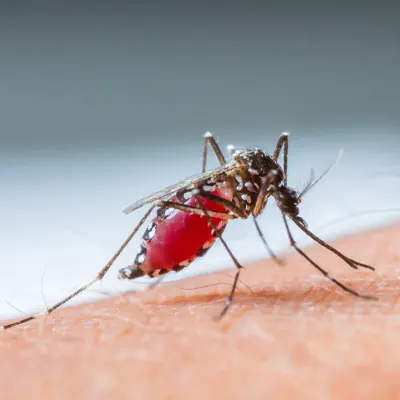
Threats
The Mosquitos are known to spread various diseases such as the West Nile virus, malaria and dengue.
Prevention:
One must ensure that breeding spots of mosquitos such as stagnant water are eliminated. This includes birdbaths, ponds, unfiltered pools, which all poses a huge breeding ground for mosquitos. We can also introduce mosquito-eating fish like gambusia, green sunfish and bluegills in stagnant water, which hinders the growth of mosquitos to a certain extent.
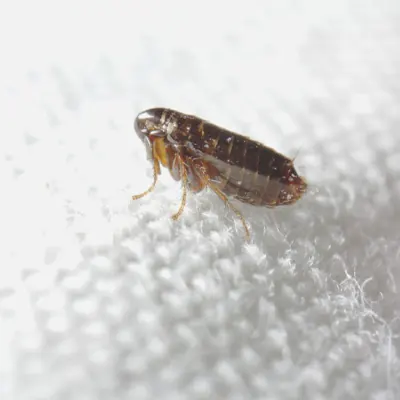
Flea
They are parasites that are most commonly found in areas where there is high shade and humidity. Most adult fleas are also found on the backside of cats and dogs, providing a suitable resting place for fleas to grow.
Habits
THE Fleas infest both wild animals as well as domesticated animals and help them to travel long distances. They have powerful legs, which helps them jump to a height of 8 inches vertically and 16 inches horizontally.
Habitat
The Fleas requires warm and shady locations for their survival and can also be found in shoes, pants, jackets etc. They tend to infest opossums, raccoons and skunks in urban backgrounds.
Threats
They are known to transmit serious diseases such as bubonic plague and bacterial diseases called murine typhus through infected rats. Their saliva can cause serious Flea Allergy Dermatitis in pets and also similar allergic infections in human beings.
Prevention:
One must ensure total prevention of laying eggs and thorough cleaning and vacuuming of the surroundings. One must also keep their lawns groomed to limit the rodent population and hire efficient pest control to hinder the growth of fleas and pests.
Bed Bugs
Bed bugs are most commonly found in almost every corner of the world and tend to infest public places such as hotels, private trains, cruise ships, schools, hospitals, etc.
Habits
The Bed bugs tend to feed on human blood, which helps them complete their life cycle split into five nymph stages. The Bed bugs like to stay near the hosts and usually travel a longer distance to fulfil their requirements.
Habitat
The Bed bugs are found in small cracks, crevices and are generally found behind baseboards, upholstery, wallpaper and furniture crevices. They usually congregate on rough, dry surfaces such as beds, bedding, clothing, and furniture during the daytime.
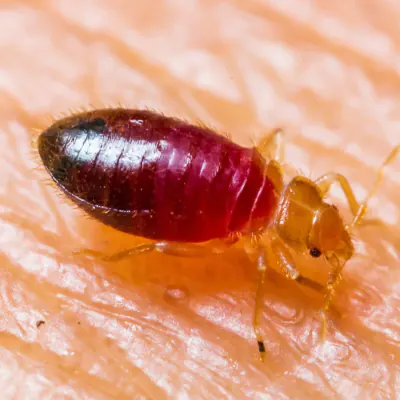
Threats
Bed bugs tend to feed on human blood, which causes itching and irritation to people. In certain conditions, the bite of bed bugs causes skin problems among people.
Prevention:
One must consistently change bedsheets and look out for any major signs, which helps detect the presence of Bed bugs. It is highly recommended to use flashlights, which helps search for bugs in remote corners of the bed and also, the bed must be cleaned regularly and thoroughly.
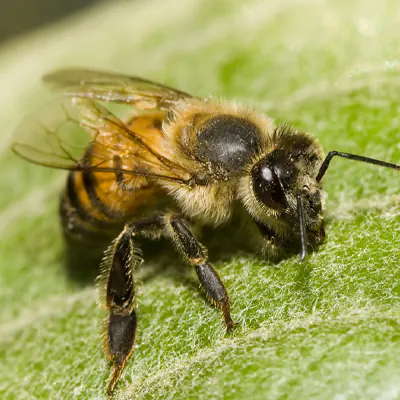
Africanized (“Killer”) Bees
The Africanized Bees are found in various places and regions such as southern California, southern Nevada, Arizona, Texas and New Mexico.
Habits
The Africanized Bees are highly aggressive and defend their habitat when attacked. They also get highly agitated by sounds of high vibrations such as tractors, lawn-movers etc.
Habitat
The Africanized bees tend to build their nests near human settlements and prefer to live in gardens, woodland, meadows, orchards, etc.
Threats
They tend to attack human beings in large numbers and causes considerable pain to the people, which sometimes prove fatal.
Prevention:
A professional Pest Control must be consulted to keep a check on the growing influence of bees. In case of an attack, one is advised to run in a zig-zag manner and seek shelter in a vehicle.
Carpenter Bees
The Carpenter bees are usually found in woodland and fin areas near trees and plants. They are solitary bees and do not flock in groups, unlike other species.
Habits
They are solitary insects, and female insects will tend to chew a piece of wood to build a nest gallery. The bits of wood that are chewed and deposited outside their nests are called frass. The male carpenter bees guard the nest and produce a constant buzzing noise.
Habitat
The Carpenter bees usually choose softwoods to lay their eggs and protect their larvae as they develop fully.
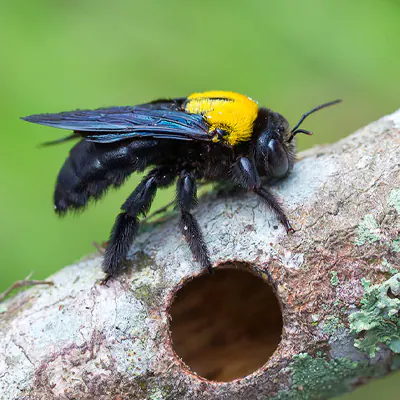
Threats
Though they do not pose any threat to the person’s health, they can cause considerable damage to trees and plans during the building of their nest.
Prevention:
The Carpenter bees usually prefer bare wood, and staining can help a great deal control its presence. Also, one must consult a suitable pest control professional to limit carpenter bees near human settlements.
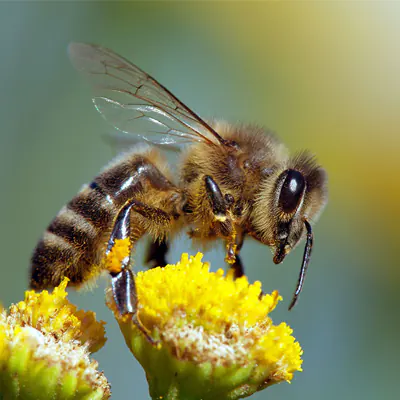
Honeybees
The Honey bees are social insects found in every nook and corner of the world and are extremely beneficial due to their role in pollination and have pollinated more than 100 crops.
Habits
The Honey bees are active pollinators and produce honey used to feed their younger ones during the cold season. The honey bees have a longer life span than other species.
Habitat
The Honey bees often built their nests called ‘Honey combs’, which are often built in crevices of trees which is their preferred destination for building nests. Sometimes, they also build nests in crevices as well as attics.
Threats
The Honeybee has quite a vicious sting which causes pain to the person. It may also cause severe swelling if the stinger is not removed from the sting, and those who are allergic to sting bites will have much more adverse reactions.
Prevention:
Honey bees colonies have to be handled by an experienced professional as it poses a huge risk. The person must be having appropriate knowledge regarding the handling and removal of honeycombs.
Open Pipe Mud Daubers
The Open Pipe mud daubers are commonly found in the North American region throughout Canada, USA and Mexico. They are solitary wasps and do not socialize or mingle in groups.
Habits
They are solitary wasps and do not move in groups, unlike other species. The Mud daubers tend to attack spiders for their larvae by injecting venom into their bodies.
Habitat
The Female Mud Daubers construct nests of mud and are usually about 1” long and are constructed side by side. They build their nests in a sheltered sites such as porch ceilings, garages, sheds, barns etc. The nests show a deep hole in them when the wasp emerges, which indicates that the nest is old and inactive after springtime.
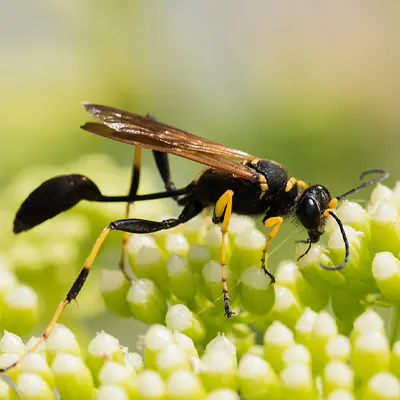
Threats
The Mud Daubers do not defend their nests and do not offer much resistance when attacked.
Prevention:
The Mud Daubers are not typically dangerous, but one must exercise caution while dealing with them. It is highly recommended that one consults an experienced professional for the removal of abandoned wasp species.
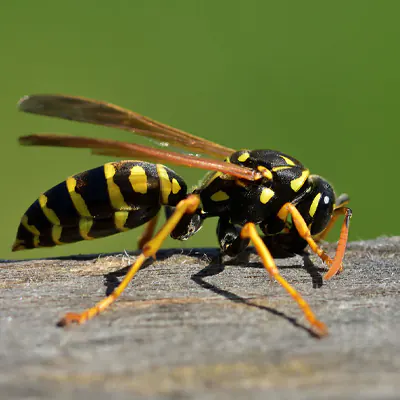
Yellowjackets
The Yellowjackets are most commonly found in Northern America, especially in the United States of America (USA). They are largely concentrated in the southwestern region of the country and often live in various places.
Habits
One of the most peculiar aspects of yellow jackets is that they consume protein during the larval stage. The worker class is assigned to bring insects and other types of meat as food for the larva. They are usually categorized as garden pests.
Habitat
They are almost found everywhere and are most common in recycling bins, attics, and places where sugars are most common.
Threats
The sting bite of Yellowjackets may cause adverse reactions and allergic problems for human beings.
Prevention:
It is important to maintain safety precautions while dealing with Yellowjackets and contact a pest control professional if necessary. One must also take care in ensuring that no meat or sweet drinks are lying out inaccessible areas,
Paper Wasps
Paper wasps are found in a variety of places and have around 300 species all across the world. Around 22 of such species are found in the USA and are also called umbrella species.
Habits
The Paper wasps tend to live in small colonies and feed on nectar and other insects ( caterpillars, flies)
Habitat
The Paper wasps are most commonly found in comb nests and twigs, branches. Porch ceilings etc. In autumn, inseminated females seek places to spend their winter and find their way indoors if a cathedral ceiling is present.
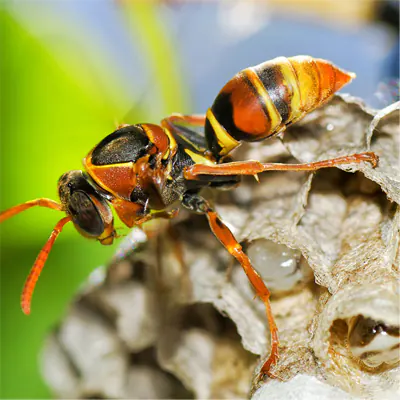
Threats
They are harmless. However, they might sting back if Confronted or attacked. The sting bite may cause adverse allergies.
Prevention:
It is important in ensuring wood fences and deck railings with a Repellant oil and deters paper wasps from gathering cellulose from wood. In case of suspected paper wasp infestation, it is important to consult an experienced pest control professional while helping in the safe removal of paper wasps from nearby premises.
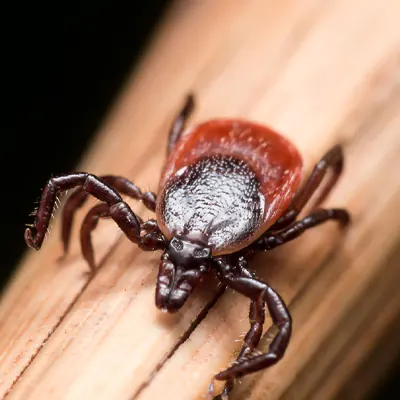
Blacklegged (Deer) Ticks
The black-legged ticks are found in parts of the eastern United States and the country’s Northeastern region.
Habits
The ticks like to feed on the blood of white-tailed deer and are also known by the name deer ticks.
Habitat
The Black Legged ticks prefer shrubs and grassland for hiding and habitation.
Threats
The Black Legged ticks tend to spread Lyme Disease, which can severely impact persons’ health.
Prevention:
When in an area where ticks are common, it is quite important to wear a long-sleeved shirt and pants, which helps in the easier detection of ticks. When we return indoors, it is quite important to inspect the clothes thoroughly and check for ticks. It is also advisable to use a verified tick repellant, which helps control the presence of ticks.
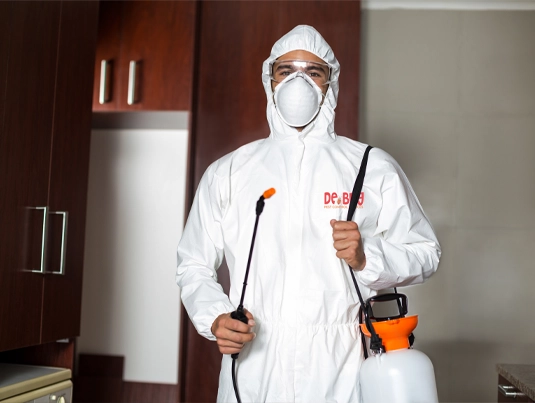
Appointments
Pest bugging you? Contact the best pest control in the United Arab Emirates.
Please fill in the contact form from the below link and one of our customer service executives will get back to you as soon as possible. It’s our pleasure to help you get rid of your pest problems. Live stress-free, pest-free. We provide pest control services all across the UAE with offices in Abu Dhabi, Dubai, and Sharjah.
